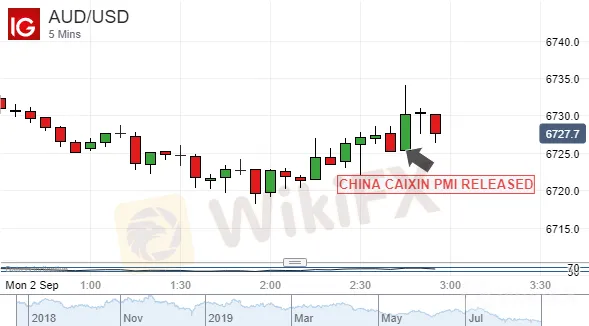简体中文
繁體中文
English
Pусский
日本語
ภาษาไทย
Tiếng Việt
Bahasa Indonesia
Español
हिन्दी
Filippiiniläinen
Français
Deutsch
Português
Türkçe
한국어
العربية
Australian Dollar Ticks Up, China Caixin PMI Flags Surprise Expansion
Abstract:The Australian Dollar got a small burst of life on news that Chinas private manufacturing sector did better than its large, state-run partner last month.
Australian Dollar, China Caixin PMI Talking Points:
China Caixin PMI came in at 50.4 for August
Thiswas the first expansion recorded in three months
AUDUSD is focused on the RBA and Australian GDP data this week, but inched up after the China number
What do retail foreign exchange traders make of your favorite currencys chances right now at the DailyFX Sentiment Page
The Australian Dollar rose a little Monday on news of a surprise return to expansion for Chinese manufacturing.
The August Purchasing Managers Index snapshot from media group Caixin came in at 50.4, for its highest reading since March and the first return to growth in three months. In the logic of PMIs any reading below 50 signifies contraction in the sector. The Caixin survey focuses on smaller, private concerns in contrast to the large, usually state-run enterprises recorded by the official PMI.
That was released on Sunday and showed a forth successive month of contraction in August. With trade worries still dogging the Chinese economy, this modest bounce back for the Caixin variant should be viewed with some caution. Still, it does speak to a degree of resilience which may stem from smaller firms focus on the Chinese domestic markets.
AUDUSD rose in the aftermath although the effect of the data may have been somewhat muted by comments from Australian Prime Minister Scott Morrison which crossed the wires just before. Morrison said he expected ‘soft’ second quarter growth data this week.

On its daily chart the Australian Dollar remains clearly unloved and close to eleven-year lows. The currency faces huge hurdles both global and domestic. It‘s arguably the currency market’s favorite play on both global and Chinese growth, with both in question as theyve not been since the financial crisis.

Domestically Aussie bulls have had to cope with interest rates falling to a new record low of 1%, and with the fully-priced prognosis that at least two more quarter-point reductions are coming. The Official Cash Rate is thought likely to remain steady at the Reserve Bank of Australias Tuesday policy meet however.
The market is also looking with some trepidation to official Australian GDP data due on Wednesday. Even if this series holds up beetter than the Australian Prime Minister expects it may be viewed as historic given the trade and recession worries which have roiled financial markets in the past month.
Commodity price weakness is also weighing on the Australian Dollar, with the price of key Australian export iron ore collapsing through the month as investors fret weak end-demand in a slowing world. The price of this commodity can be a key currency driver.
Australian Dollar Resources for Traders
Disclaimer:
The views in this article only represent the author's personal views, and do not constitute investment advice on this platform. This platform does not guarantee the accuracy, completeness and timeliness of the information in the article, and will not be liable for any loss caused by the use of or reliance on the information in the article.
Read more

Currencies wait for RBA to kick off big central bank week
The dollar hovered below recent highs on Tuesday as traders waited for the Reserve Bank of Australia to lead a handful of central bank meetings set to define the rates outlook this week.

Australian Dollar Price Chart: AUD/USD Reversal Stalls– Trade Outlook
The Australian Dollar is up more than 2.6% on the back of a five-day rally with price eyeing initial resistance. These are the levels that matter on the AUD/USD charts.

Stocks Mixed As RBA Leaves Rates Alone, Australian Data Mixed Too
Equities were mostly lower, if not by very much. Australian interest rates remained at record lows. That was as expected, but retail sales disappointed as the current account surged ahead

Iron Ore Prices Slide On Trade War Fears, AUD-Watchers Take Note
Australian Dollar watchers should keep a close eye on iron ore prices. They fell sharply last month, albeit from very high levels
WikiFX Broker
Latest News
Why Are Financial Firms Adopting Stablecoins to Enhance Services and Stability?
Experienced Forex Traders Usually Do This Before Making a Lot of Money
Octa vs XM:Face-Off: A Detailed Comparison
When High Returns Go Wrong: How a Finance Manager Lost RM364,000
Bridging Trust, Exploring Best—WikiEXPO Hong Kong 2025 Wraps Up Spectacularly
Fidelity Investments Explores Stablecoin Innovation in Digital Assets Sector
Interactive Brokers Expands Crypto Trading with Solana, XRP, Cardano, and Dogecoin
SEC Ends Crypto.com Probe, No Action Taken by Regulator
Why More People Are Trading Online Today?
Broker Comparison: FXTM vs XM
Currency Calculator







